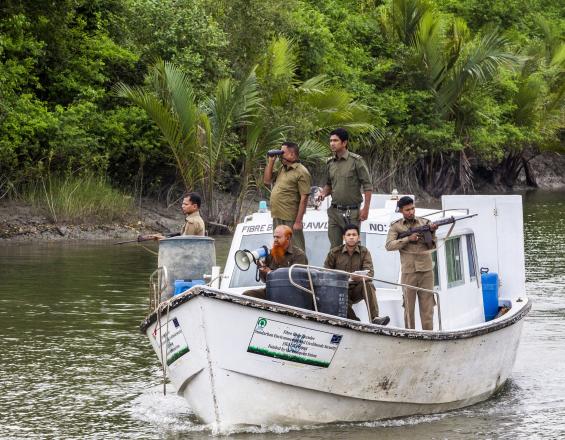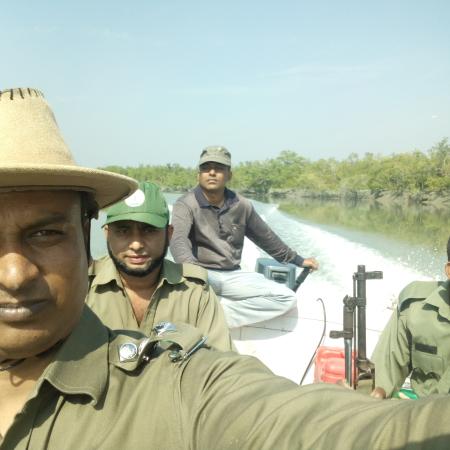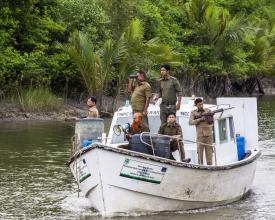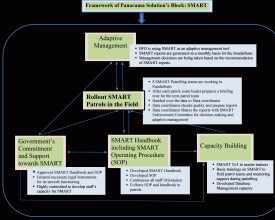
Spatial Monitoring and Reporting Tool (SMART) for Effective Law Enforcement and Wildlife Monitoring in the Sundarbans Mangrove Forest, Bangladesh

SMART (Spatial Monitoring and Reporting Tool) is an evidence-based data collection and reporting system for wildlife and forestry law enforcement monitoring. SMART is a combination of software, training materials and implementation standards for systematic law enforcement and monitoring patrols. SMART is designed to improve anti-poaching efforts and overall law enforcement effectiveness in established conservation areas and management zones. Since June 2016, in collaboration with the Wildlife Conservation Society, Sundarbans Management Project SMP (jointly implemented by GIZ and Bangladesh Forest Department and funded by the German Federal Government) initiated SMART patrols across the whole Sundarbans. SMP initiated capacity development efforts with basic and advanced skill development of individual BFD staff on SMART’s application, data analysis, report generation, interpretation of findings, as well as setting standard protocols for practising SMART patrolling in the Sundarbans.
Context
Challenges addressed
Wildlife poaching, fishing using illegal gears, illicit tree cutting are the biggest challenges in the Sundarbans. Traditional forest patrolling were unable to generate expected quality information on observations/threats. It was also difficult for managers to monitor patrol efforts of their staffs. Information generated through traditional patrols was also inadequate to use for adaptive management. Limited capacity/skills of frontline staffs and lack of proper knowledge on applicable laws/rules couldn’t produce expected patrolling outcomes. A very complex resource management in the Sundarbans with the provisions of seasonal ban, species ban, area ban etc. makes the situation even worse for the frontline staffs .
Moreover, inadequate data (forest crime/biodiversity hotspots, offender database), absence of standardized patrolling protocols and digitalized records, and data gathering devices, inadequate logistics/allocations impeded successful patrol planning and implementation.
Location
Process
Summary of the process
SMP standardized SMART protocols for Sundarbans including operating procedures, harmonized data models, training curricula in the form of government approved handbook vis-à-vis continually made efforts to build capacity of BFD staffs in patrolling, data gathering, analysis and reporting and eventually fed the findings into decision making for adaptive management. Government remained highly convinced and committed to do needful for its success since piloting efforts in the Sundarbans. BFD has established SMART as an adaptive management tool and envisioned to introduce SMART in all the protected areas of the country. Government’s commitments, standardized protocols and continual capacity enhancement efforts have collectively interacted and built the blocks towards successful enrollment of SMART patrolling in the Sundarbans and providing insights to adaptive management.
Building Blocks
SMART Handbook including SMART Operating Procedure (SOP)
‘SMART Handbook’ were jointly developed with the BFD and includes valuable contributions by a multi-stakeholder’s SMART working group members. The SOP constitutes a crucial milestone and presents a uniform and practical framework for implementing SMART in the Sundarbans. The provisions that were incorporated in the SOP and Handbook are consistent with the laws and regulations of the ‘Government of Bangladesh’. All the staffs involved in SMART patrolling were oriented on the ‘SMART Handbook’ and ‘SOP’ and everyone have a hard copy of the same. This helps them to guide during patrols.
Enabling factors
Strong cooperation among different development partners and BFD that ensured perfect joint work environment;
Formation of SMART – Technical Work Group with the participation of all active development partners helped to provide expert inputs and suggest directions;
BFD’s willingness to technical expertise and develop future-proof protocols for Sundarbans.
Lesson learned
Outputs (Handbook, SOP) are widely accepted due to engagement of all potential stakeholders;
Lengthy process and hard work.
Government’s Commitment and Support towards SMART
BFD was looking for an effective conservation law enforcement option that would equally be practical and affordable in the context of Sundarbans. Attaining good results from piloting initiatives inspired BFD to full-scale implementation in Sundarbans. However, implementing SMART independently but efficiently was a big challenge since BFD was solely dependent on external supports (i.e. Projects). SMP’s approach to develop pool of master-trainers for SMART, use them to train frontline staffs, develop data managers and analyzers had highly motivated BFD towards more independent SMART rollout in the Sundarbans.
BFD realized the need and responded promptly to develop standard SMART protocols for Sundarbans jointly with developers and relevant stakeholders and brought into practice. With the approval of SOP, handbook and other related documents, BFD ensured necessary legal instruments for its smooth functioning. It also maintained sustained fund flow to cater the need of logistics and fuel to keep SMART operational.
Enabling factors
- BFD was highly convinced with the SMART approach and standards;
- Young, dynamic and positive leadership at Sundarbans level helped BFD to set out its long-term vision and conceive potential benefits of SMART;
- Government at its highest level shown its commitment towards conservation of Sundarbans and ready to do whatever required.
Lesson learned
N/A
Capacity Building
Comprehensive training material developed and provided to support SMART trainings. BFD frontline staff’s capacity has been built to successfully conduct SMART patrolling in the field and handlings of necessary equipment and gadgets. Three different training efforts were made available –
- SMART Training of Trainers - selected BFD mid-level staffs trained engaging expatriate facilitators on the basics as well as advanced skills on SMART patrolling using developed training materials, 41 best-performers identified and designated as ‘master trainer’.
- Basic SMART Patrolling - ‘master trainers’ trained (in presence and support of expatriate facilitators) 125 frontline BFD staffs on the basic skills of SMART patrolling, conducted demo patrols, physical handling of gadgets and equipment who later became active in patrolling team.
- SMART Database Management - 31 BFD Officers were trained on data cleaning, editing, analysis, report generation and interpretation of findings. Selected staffs received advanced data management training also.
SMART patrol teams in the Sundarbans were accompanied by on-board mentors in selected patrols and helped to overcome their problems on-site particularly on the use of a Global Positioning System (GPS), navigation, boat and foot patrols, law enforcement, and improved data collections and ensured quality.
Enabling factors
- Criteria for participant selection – educational background, young/energetic, enthusiasts,
- Best performing staffs with proven track records were selected for SMART.
- Good number of staffs poses minimum required capacity to attain such trainings and use SMART
- Staffs have considerable patrolling experience
- New recruits of BFD with good computer literacy helped data management/analysis
Lesson learned
- Frequent transfer/rotation of staffs within BFD
- positive – trained staffs would be helpful for national rollout
Rollout SMART Patrols in the Field
8 teams formed for SMART patrolling in 4 Forest Ranges of the Sundarbans. A mother vessel, one fiber-body trawler (for patrols in the canals and creeks) and a speed-boat to go to the areas where trawler couldn’t access due to narrow width of canal/creek and less water depth as well as to chase offenders. Under the leadership of a Team Leader, each team stays in the field for 10-14 days and patrols crime hotspots, records sightings of key wildlife species, illicit activities, checks permits and necessary documents, gadgets/gears of fishers, arrest offenders, handover offenders to nearby Forest Offices, records all data in the data model configured in the handheld device (i.e. CyberTracker).
After completion of the trip, Team hands over their handheld device to ‘Data Manager’ for data quality checking and unload data in the data storage platform. Team Leader also make a briefing note for the next patrol team highlighting their coverage areas, potential crime hotspots and dierction for next patrol team. Cleaned data then comes to ‘Data Coordinator’ who then compile data from all 4 Ranges, analyze and generate reports with` findings in different graphs, shows trends, hotspots, information on offenders and arrested ones, etc. and present to SMART enforcement committee to help further decision making and adaptive management.
Enabling factors
- Functional SMART enforcement committee – engagement of Technical Working Group (DPs) as observer
- SOP and Handbook – less chance for misconception/confusion since all provisions and arrangements were documented, agreed and approved
- Provision of on-board mentoring helped to minutely address issues of individual staffs and improve their abilities to use gadgets;
Lesson learned
Backup manpower is required particularly for data management/analysis
Adaptive Management
BFD has started using SMART as an adaptive management tool in the Sundarbans which is among the key potential benefits of the approach.
Presentation of reports to SMART enforcement committee helped the decision makers of BFD to plan patrols based on data queries and interpretations from actual SMART reports. This with on-board mentoring observations helped BFD decision makers to take further management decisions.
BFD is using SMART patrol reports and assess how patrol plans have been adapted based on the results of previous patrols and how effective these adaptations have been in increasing the effectiveness of SMART patrols as evidenced by the area covered, number of arrests and successful prosecutions of criminals committing serious wildlife, fisheries and forest crimes such as poaching and poison fishing; confiscations of boats, weapons, snares and traps, and wildlife carcasses and body parts; and trends (increasing, stable or decreasing) in sighting rates of key threatened wildlife species.
Enabling factors
Awareness of managers on adaptive management and role of SMART data on that front
Lesson learned
BFD need to enhance capacities of managers to play with SMART data and project/forecast changes/trends and incorporate forward looking measures towards conservation
Impacts
SMART (Spatial Monitoring and Reporting Tool) is an evidence-based data collection and reporting system for wildlife and forestry law enforcement monitoring. SMART is a combination of software, training materials and implementation standards for systematic law enforcement and monitoring patrols. SMART is designed to improve anti-poaching efforts and overall law enforcement effectiveness in established conservation areas and management zones. SMART patrolling was piloted in part of the Satkhira Range of Sundarbans. Since June 2016, in collaboration with the Wildlife Conservation Society (WCS), Sundarbans Management Project – SMP (jointly implemented by the Deutsche Gesellschaft für
Internationale Zusammenarbeit (GIZ) GmbH and Bangladesh Forest Department – BFD and funded by the German Federal Government) initiated SMART patrols across the whole Sundarbans. SMP initiated capacity development efforts with basic and advanced skill development of individual BFD staff on SMART’s application, data analysis, report generation, interpretation of findings, as well as setting standard protocols for practising SMART patrolling in the Sundarbans.
Beneficiaries
Frontline staffs of Bangladesh Forest Department and PA Managers and resource users
Sustainable Development Goals
Story

Mr. Belal Hossain joined Sundarbans Reserved Forests on 19/09/2016 as a Forester without having any idea of SMART patrolling. He was immediately posted in Burigolaini Station of Satkhira Range of Sundarbans West Division as Station Officer.
He received his first basic training on Spatial Monitoring and Reporting Tool (SMART) patrolling in June 2017 from the Sundarbans Management Project (SMP) implemented jointly by BFD and GIZ. He joined his first SMART patrol in the Sundarbans as a team leader of Satkhira SMART Patrol Team -2 in January 2018. Since then he has led 4 SMART teams in the Sundarbans and spent over 40 days in SMART patrolling in the Sundarbans. But the major shift in his career took place in July 2018 when he took over the role of SMART data coordinator for the whole SRF. SMART data coordinator for the SRF is responsible for reviewing and compiling all exported patrol data; drafting a combined monthly report on SMART patrols for the whole SRF with recommendations; presenting the SMART monthly report in front of the SMART enforcement committee and after finalization of the SMART report storing all documents (hard and soft copies).
Since then Mr. Hossain already drafted and finalized 20 SMART monthly reports and 2 SMART annual reports for the whole SRF. Right now, Mr. Hossain is continuing his role as SMART data coordinator for SRF along with his main function as Station Officer of Kobadak Forest Station and Team Leader of Satkhira SMART patrol team -2.
“Working with SMART has given me the confidence to carry out multiple tasks with efficiency and greatly enhanced my presentation skills. Tracing and dealing with offences became easier in the Sundarbans with introduction of SMART” said Mr. Hossain when he was asked what the main contribution of SMART in his career is. Mr. Hossain is a very confident Forester now and received several other trainings from SMP and other project of BFD including an exposure visit to India.










